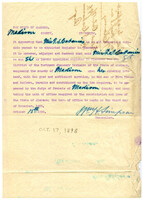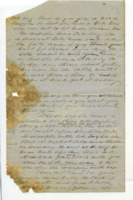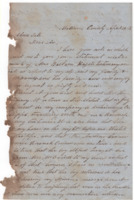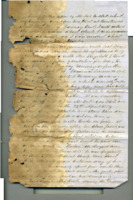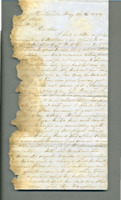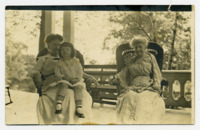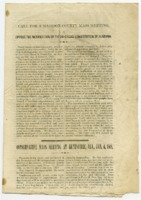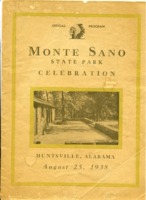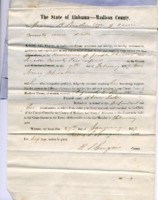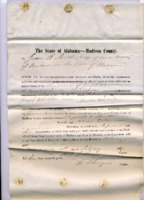
Browse Items (56 total)
Sort by:
-
Partial deposition and court questions.
This page is most likely missing a few pages. The front details someone's statement, though the author is unknown. It tells of phrases spoken by Abner Tate that were overheard by Mrs. Hazel. The botton of the page inquires what the author/interviewee would think if they heard such phrases. The last line appears to have the initials S. D. G. that may be the author of the page. The back side includes questions 13 through 18 that were most likely asked in court. -
Letter to Abner Tate.
The letter to Abner Tate addresses the testimony of Barbara Hazel, confirming some parts but refuting more of it. It is clear that pages of the letter are missing as it ends in the middle of a sentence and has no author's signature on any page. Note: This could be Moore's statement which would match with the Note to Moore's Statement. -
Testimony of a Resident of Elizabeth Routt as Requested by Abner Tate.
The author of this written statement is illegible. It appears that the first name of the author may be Francis but it being so faded, is difficult to discern. The author does state that he was living with Elizabeth Route at the time and managing her plantation, during which he became aquainted with Daniel H. Bingham. The written statement, recorded as the author was "called upon by Mr. Tate to state what my testimony was upon his trial...", details the interaction of the author with Bingham, who wished to marry Mrs. Routt, and Mrs. Routt, beginning in March 1854 through 1855. -
Letter Regarding the Case and Barbora Hazle's Statements.
This letter, written on May 12, 1856, has several names that are illegible, including the author's. It is addressed to two men, the first being [Daniel] P. Pool, and is a lengthy letter in response to a letter received from Abner C. Wellborn and in particular, the supporting testimony of Barbara Hazel accusing Abner Tate of at least two murders. The author states that the credibility of Hazel's words should be questioned due to the several reasons he goes on to detail. Following the original letter, the author pens an amendment to include changes that occured since the original letter was written as Tate had made a recent publication during that time. -
Postcard of a woman, possibly Virginia Clay-Clopton, and companions.
The back of this real photo postcard reads, "Virginia Clay Clopton, age 90." -
"Call for a Madison County Mass Meeting, to Oppose the Ratification of the So-Called Constitution of Alabama."
This broadside was published by conservative Alabamians in opposition to the 1868 Alabama constitution, known as the "Reconstruction Constitution." The constitution was revised by the constitutional convention on November 5, 1867, and ratified in 1868. -
Official program of the Monte Sano State Park Celebration.
This celebration was held on the park's opening day. Events included a parade, an address given by Speaker of the U.S. House of Representatives William B. Bankhead, a history pageant, and a "Queen's Ball" that evening at the Russel Erskine Hotel. The program includes a description of the cabins, the "Legend of Monte Sano," a history of Huntsville, and a program for the history pageant, titled "The Parade of Progress." -
Deposition of Nancy Whitaker.
Nancy Whitaker acted as a witness for the defendant, Abner Tate. Nancy responds to questions about Alexander Jeffries, her father, and Elizabeth Routt. She expresses her belief that her father was poisoned by Routt though she was not present until the morning after he died. Nancy details the dark color of her father's body and how it was swollen and "unnatural" in appearance. She also includes the rumors she has heard regarding several charges brought against Routt. She concludes by stating that it is her opinion that Routt is guilty in the case of her father's death. -
Depositions of Joseph Whitaker and Newton Whitaker.
The Whitakers were witnesses for the defendant, Abner Tate. Joseph Whitaker's deposition is first. He answers questions regarding Elizabeth Routt and her husbands, particularly the death of Alexander Jeffries. Joseph states that it is his opinion that Jeffries was poisoned. He also states that rumors have spread that she had ordered a slave to murder Abner Tate. Newton Whitaker's desposition is second. He also answers questions regarding Elizabeth Routt and her husbands, including the death of Alexander Jeffries. Newton states that he is also of the opinion that Jeffries was poisoned. Like Joseph, he also adds that she is said to have destroyed the lives of her husbands, stole cotton, and sought to harm Abner Tate.
